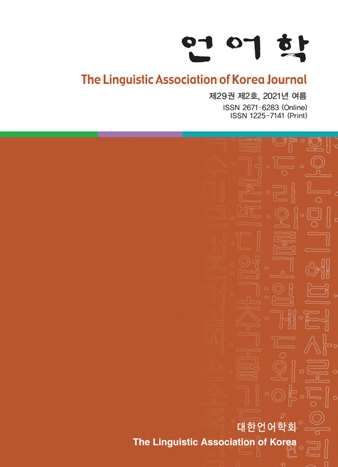대한언어학회 전자저널

29권 2호 (2021년 6월)
Abstract
Ahn, Jeong Khn. (2021). A pragmatic study of agentive and time expressions in Korean. The Linguistic Association of Korea Journal, 29(2), 143-161. The present study undertook four surveys to examine 1) how Koreans describe incidents using agentive or non-agentive expressions, 2) how they are affected by agentive or non-agentive expressions when they blame someone for an incident, and 3) how they express time and interpret it in certain contexts. The surveys were given to two online undergraduate classes at a Korean university in 2020. Based on the responses, the study found that 1) Koreans used agentive expressions more often than non-agentive ones when they described incidents which occurred intentionally, 2) they generally used passives rather than agentive or non-agentive expressions when they described incidents which occurred unintentionally, and 3) they were more affected by agentive expressions than non-agentive ones when they called someone to recount an incident. The study also found that Koreans generally saw time proceed from the past to the future uni-directionally and horizontally on a time-line, and they expressed time in spatial terms rather than in temporal terms on the one hand and in time-moving metaphors rather than ego-moving metaphors on the other.
Keywords
# ergative # agentive and non-agentive expressions in Korean # time in spatio-temporal terms for Koreans # time in metaphors for Koreans
References
- Amidu, A. (2010). Motivation and transitivity: the problem of intransitive in Kiswahili Bantu. The Linguistic Association of Korea Journal, 18(4), 1-26.
- Boroditsky, L. (2000). Metaphoric structuring: Understanding time through spatial metaphors. Cognition, 75, 1-28.
- Boroditsky, L. (2001). Does language shape thought?: Mandarin and English Speakers’ Conceptions of Time. Cognitive Psychology, 43, 1–22.
- Boroditsky, L. (2010). Lost in translation. The Wall Street Journal. Dow Jones & Company, July 24, 2010.
- Choe, Y. (1981). In quest of the agentive case. The Journal of English Language and Literature, 27(4), 813-827.
- Clark, H. (1973). Space, time, semantics, and the child. In T. E. Moore (Ed.), Cognitive development and the acquisition of language (pp. 27-63). New York: Academic Press.
- Dowty, D. (1991). Thematic proto-roles and argument selection. Language, 67(3). 547-619.
- Fausey, C., & Boroditsky, L. (2008). English and Spanish speakers remember causal agents differently. In Proceedings of the Annual Meeting of the Cognitive Science Society, 30, 205-210.
- Fausey, C., & Boroditsky, L. (2010). How much for a transitive? Subtle linguistic cues influence blame and punishment. In Proceedings of the Annual Meeting of the Cognitive Science Society, 32, 1336-1341.
- Fillmore, J. (1971). The Santa Cruz lectures on deixis. Bloomington, IN: Indiana University Linguistics Club.
- Kim, J. (2012). Multiple subject constructions in Korean. Language and Linguistics, 54, 97-123.
- Kim, K. (2008). A contrastive analysis on agency in English and Korean. The Linguistic Association of Korea Journal, 16(1), 151-173.
- Igor, M. (2015). “Multiple Subjects” and “Multiple Direct Objects” in Korean Language Research, 51(3), 485-516.
- Lakoff, G., & Johnson, M. (1980). Metaphors we live by. Chicago, IL: University of Chicago Press.
- McTaggart, J. (1908). The unreality of time. Mind, 17, 457-474.
- Traugott, E. (1978). On the expression of spatiotemporal relations in language. In J. H. Greenberg (Ed.), Universals of human language: Word structure, Vol. 3 (pp. 369-400). Stanford, CA: Stanford University Press.
- Yoon, J. (2009). Aspect and Agentivity in Korean Multiple Subject Constructions. Studies in Generative Grammar, 19(2), 211~237.
- http://en.wikipedia.org/wiki/Agent-(grammar)